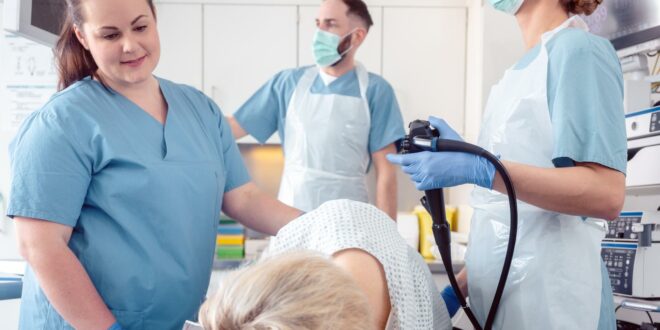Janelle G. is a physician’s assistant in a Colonoscopy Center in New England. She has been in attendance for countless procedures and has been working with surgeons for over 20 years. She generously offered a review on the procedure itself.
My husband recently has been rescheduled for an upcoming colonoscopy this coming July. And when I spoke with Janelle I asked if I could interview her, to which she readily replied, “oh sure!”
Since this is such an important screening, I wanted to share with the readers some insight, and how it can and has saved lives. Colonoscopy screenings are a vital preventive health measure that can significantly reduce the risk of colorectal cancer, which is highly treatable when detected early. Here’s a brief overview of the importance of colonoscopy screenings, the procedure, and preparation as discussed with Janelle G. It is my hope that any of you who are reticent about getting a colonoscopy will find this helpful in making a very important decision about your health and serve as a guidance for your loved ones too.
CD Hello Janelle, thank you for taking the time to provide us with an interview and some valuable and lifesaving information for our readers.
JG Absolutely! It’s so important, I can’t get the info out fast enough to those who need to heed just what an important aspect this is in their health.
CD So I understand that the age for screening is now younger. Previous years, it was 60 for the first time. Now it can be much younger. It that correct Janelle?
JG Yes. That is correct Camille. It is much younger. Early Detection is so vitally important. Colonoscopies can detect precancerous polyps and colorectal cancer in its early stages, often before symptoms develop. Removing polyps during a colonoscopy can prevent them from developing into cancer. And it is a life-Saving routine procedure. Regular screenings starting at age 45 are key to preventing colorectal cancer and finding it early, which is crucial for successful treatment.
CD And am I to understand that if a family member has had cancer, the screenings can actually begin earlier, like 35 or 40?
JG Yes, you are correct. You obviously are a medical person.
CD Yes, correct. So please walk us through for those who don’t know, just what happens prior, during and after this procedure.
JG A significant number of colorectal cancers begin as polyps, which are growths on the inner lining of the colon or rectum. Not all polyps will turn into cancer, but removing them can prevent cancer from developing, therefore stopping or putting the brakes on something that can turn “ugly.”
CD A lot of people are concerned about the prep more than the procedure.
JG Yeah-that’s right again. There is some prep work, but like anything worthwhile we have to work a little to get results, right? You’ll need to follow a low-fiber diet for a few days and then switch to a clear liquid diet the day before the procedure. There is Bowel Prep- The evening before, you’ll take a prescribed laxative to clean out your colon, which is essential for a clear view during the procedure. Then Fasting -You’ll need to fast and avoid solid foods the day before, and stop drinking liquids a few hours before the procedure. It’s a pain in the rear – pardon my pun – But it’s not for life!
CD Right and there are many different types too. Tablet form, and liquids.
JG You’re good Camille! Want a job? (She laughs here!) Yes, depending on your age, medical factors and such, the doctor prescribes the proper prep for the patient to drink. Tablets are also on the list, but they are huge and most people rather drink. The drink is divided into two parts. One time the night before. And then the second part five hours before the procedure to make sure you are totally clean.
CD The morning of. What can a patient expect when they arrive at the center?
JG Okay – You will be ushered into an area where your vitals are taken, and you will put on a dressing gown. And we go over your medical history, medicines, any allergies, etc. Then you are wheeled into the room after a little while. So, let’s talk about what is Done. During a colonoscopy, a long, flexible tube with a camera (colonoscope) is inserted into the rectum to examine the entire colon for abnormalities. The patient is lying on their side, discreetly covered, and comfortably sedated. In a conscious state. Propofol is usually given to the patient and tolerated well.
CD How long can a person expect to be in the procedure itself Janelle?
JG The Duration? Well, the procedure itself usually takes about 30 to 60 minutes, but you should plan for more time due to preparation and recovery from sedation. If there are any polyps found, they are snipped away, and sent for a biopsy, and some tissue biopsy may be done as well. This is all within the normal parameters of the colonoscopy. The point is the screening makes a difference between life and death. Colon cancer is highly curable when caught at the earliest stages. We have been making progressive leaps and bounds in this. And it is a hope one day that it will be completely stomped out.
CD So Janelle- Overall, the message is clear from where I sit. Colonoscopy screenings are a crucial step in maintaining your health and can save lives by preventing colorectal cancer. It’s a procedure with a profound impact, offering both diagnostic and preventive benefits. By understanding the importance, preparing adequately, and following through with regular screenings, we can take a proactive stance against one of the most preventable forms of cancer.
JG Seriously, now look at you go! Do you want a marketing job in here? Or write our brochures! Yes, that was a great sum up. May I borrow that for future purposes?
CD Feel free. But seriously, I thank you for this life affirming interview. As you know my husband is scheduled for one in July. It had to be rescheduled due to some other issues. But – it is very important, and I though why not share it with others. And you being right here. I can’t say how much I appreciate your time and help with disseminating such important information.
JG Oh I almost forgot.After the procedure the patient will be immediately taken to the recovery area, and monitored for about 30 minutes. When all signs of the sedation have worn off, and they are fully aware, they can leave. But someone will have to drive them to the procedure and home. We will not release them until someone safely picks them up.
CD And the results?
JG The doctor will go over the results with you that same day in recovery. If a biopsy was performed, the results will be given as soon as they are back from pathology. But the surgeon will tell of any if at all, polyps or any other abnormalities are found.
CD That’s good, get to know right away for the most part. And can the person go back to normal routine, eating and such?
JG Usually recommended that a light meal is eaten that day. And all medications can resume the next day. Nothing strenuous in terms of exercise.
CD Thank you once again Janelle. I’ll let you go and take care of your patients. God Bless you.
JG God Bless you too Camille. Are you due for one?
CD Nope! I’m all set for another 2 years! LOL
JG Laughing – Just checking.
This concludes the interview. I hope that others will find this helpful for determining their choices. Please check out statistics below to help further ruminate about this procedure, with the factual statistics.
- Incidence Rates: About 106,590 new cases of colon cancer and 46,220 new cases of rectal cancer are estimated for 2024,
- Lifetime Risk: The lifetime risk of developing colorectal cancer is approximately 1 in 23 for men and 1 in 25 for women.
- Mortality Rates: It’s expected to cause about 53,010 deaths during 2024.
- Trends: The incidence rates have dropped overall since the mid-1980s, mainly due to increased screening and lifestyle changes. However, rates have been increasing by 1% to 2% a year in people younger than 55 since the mid-1990s.
Colon Cancer Facts and Statistics: What You Need to Know (verywellhealth.com)
Jeremiah 17:14– “Heal me, O LORD, and I shall be healed; save me, and I shall be saved: for thou art my praise.”
 The Bottom Line, Ministries Christian News, Articles, & Poetry
The Bottom Line, Ministries Christian News, Articles, & Poetry 





There is nothing better than being informed! Thanks Camille for this enlightening interview that helps to put those who are due to have a colonoscopy at ease (including your dear husband!)
And thank YOU Jennifer for your kind words.
God Bless~